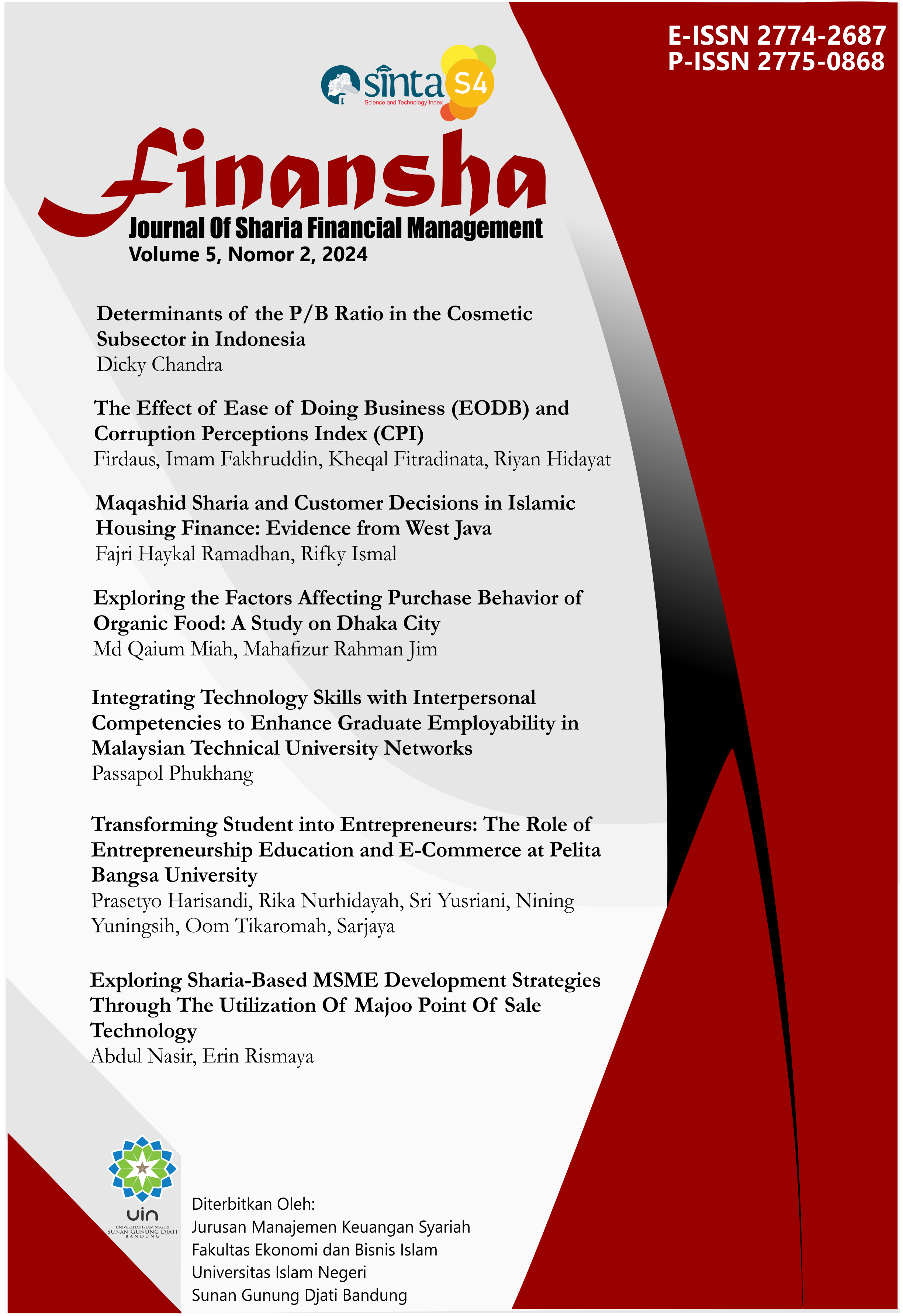THE EFFECT OF EASE OF DOING BUSINESS (EODB) AND CORRUPTION PERCEPTIONS INDEX (CPI) ON FOREIGN DIRECT INVESTMENT (FDI) IN ASEAN
DOI:
https://doi.org/10.15575/fjsfm.v5i2.34965Keywords:
EoDB, CPI dan FDIAbstract
References
Adiyudawansyah, A., & Santoso, D. B. (2012). Analisis Faktor-Faktor Yang Mempengaruhi Foreign Direct Investment Di Lima Negara ASEAN. Jurnal. Malang: Universitas Brawijaya.
Afif, F. Y. (2022). Daya Saing dan Foreign Direct Investment. Jurnal Ekonomi Pembangunan, 11(1), 52–59.
Alfaro, L., & Chauvin, J. (2020). Foreign direct investment, finance, and economic development. Faculty & Research, 1, 231–258.
Bin Nurdin, M. N., Hamzah, M., & Sofilda, E. (2023). Is the World Bank Ease of Doing Business Ratings a Determinant of FDI in a Country? Analyzing the Effects of EODB Indicators of FDI according to Countries’ Income Levels. OIDA International Journal of Sustainable Development, 16(01), 26–34.
Christianingrum, R. (2023). Korupsi dan Penanaman Modal Asing: Perbaikan Kelembagaan. Jurnal Budget: Isu Dan Masalah Keuangan Negara, 8(2), 332–353.
Contractor, F. J., Dangol, R., Nuruzzaman, N., & Raghunath, S. (2020). How do country regulations and business environment impact foreign direct investment (FDI) inflows? International Business Review, 29(2), 101640.
Corcoran, A., & Gillanders, R. (2015). Foreign direct investment and the ease of doing business. Review of World Economics, 151, 103–126.
Edo, S., Osadolor, N. E., & Dading, I. F. (2020). Growing external debt and declining export: The concurrent impediments in economic growth of Sub-Saharan African countries. International Economics, 161, 173–187.
Erdoğan, S., Yıldırım, D. Ç., & Gedikli, A. (2020). Natural resource abundance, financial development and economic growth: An investigation on Next-11 countries. Resources Policy, 65, 101559.
Fazira, D. R., & Cahyadin, M. (2018). The impact of interest rate, corruption perception index, and economic growth on foreign direct investment in ASEAN-6. Jurnal Keuangan Dan Perbankan, 22(4), 707–713.
Firdaus, F., Hambali, R., & Ziani, A. (2023). ANALISIS KOMPARATIF KINERJA KEUANGAN BANK SYARIAH DI KAWASAN ASIA TENGGARA. Inspirasi Ekonomi: Jurnal Ekonomi Manajemen, 5(3), 175–192.
Hafilah, E. N., & Ahmad, M. (2022). The Effect of Ease of Doing Business, Market Size and Political Stability on Foreign Direct Investment in Southeast Asia. Journal of Curriculum Indonesia, 5(1), 54–62.
Iksan, M., & Konishi, T. (2023). The Determining Factors of Foreign Direct Investment (FDI) Inflows: Empirical Studies from the Southeast Asian Countries. JASSP, 3(1), 28–44.
Irawan, A., & Alamsyah, H. (2021). The COVID-19’s economic crisis and its solutions: A literature review. Etikonomi, 20(1), 77–92.
Ishikawa, K. (2021). The ASEAN Economic Community and ASEAN economic integration. Journal of Contemporary East Asia Studies, 10(1), 24–41.
Martua, A., & Ginting, I. T. (2023). The Effect of Ease of Doing Business Indicators on Investment Interest. Monas: Jurnal Inovasi Aparatur, 5(2), 108–121.
Mohsin, M., Ullah, H., Iqbal, N., Iqbal, W., & Taghizadeh-Hesary, F. (2021). How external debt led to economic growth in South Asia: A policy perspective analysis from quantile regression. Economic Analysis and Policy, 72, 423–437.
Moustafa, E. (2021). The relationship between perceived corruption and FDI: a longitudinal study in the context of Egypt. Transnational Corporations Journal, 28(2).
Mundakkad, P. (2021). Ease of doing business and foreign direct investment inflows: Evidence from emerging economies. Economic Research Guardian, 11(1), 47–63.
Musyarof, Z., & Qomari, I. N. (2023). Pengaruh Pertumbuhan Ekonomi terhadap Emisi Gas Karbon Dioksida (CO2): Data Panel Negara ASEAN Tahun 2000-2019. Ecoplan, 6(2), 87–99.
Nguyen, H. T., & Darsono, S. (2022). The impacts of tax revenue and investment on the economic growth in Southeast Asian countries. Journal of Accounting and Investment, 23(1), 128–146.
OECD. (2021). Middle East and North Africa Investment Policy Perspectives. OECD Publishing. https://books.google.co.id/books?id=HZAmEAAAQBAJ
REHMAN, M. Z., KHAN, M. N., & ASLAN, H. (2022). Does Islamicity affect economic growth? Evidence from OIC, high, middle, and low-income countries. Hamdard Islamicus, 45(3).
Romadhona, N. A. (2016). Pengaruh Inflasi, produk domestik bruto, corruption perception index, dan indeks harga saham terhadap foreign direct investment di Indonesia periode (2005-2014). Jurnal Ilmu Manajemen, 1(5), 42–54.
Rong, S., Liu, K., Huang, S., & Zhang, Q. (2020). FDI, labor market flexibility and employment in China. China Economic Review, 61, 101449.
Shaari, M. S., Esquivias, M. A., Ridzuan, A. R., Fadzilah Zainal, N., & Sugiharti, L. (2022). The impacts of corruption and environmental degradation on foreign direct investment: New evidence from the ASEAN+ 3 countries. Cogent Economics & Finance, 10(1), 2124734.
Shaheen, F., Sohail, M., & Nasir, A. (n.d.). IMPLICATION OF THE EASE OF DOING BUSINESS FOR FOREIGN DIRECT INVESTMENT: A PANEL DATA ANALYSIS OF ASIAN COUNTRIES. Global & Local Economic Review, 27(1), 85.
Surya, B., Menne, F., Sabhan, H., Suriani, S., Abubakar, H., & Idris, M. (2021). Economic growth, increasing productivity of SMEs, and open innovation. Journal of Open Innovation: Technology, Market, and Complexity, 7(1), 20.
Zakiyyah, N. A. A., Lubis, F. R. A., & Ainy, R. N. (2024). The Effect Of Macroeconomic, Institutional And Corruption Variables On FDI In Asean Countries. Journal of Economic, Bussines and Accounting (COSTING), 7(3), 5673–5685.
Downloads
Published
How to Cite
Issue
Section
Citation Check
License
Authors who publish with this journal agree to the following terms:
- Authors retain copyright and grant the journal right of first publication with the work simultaneously licensed under a Creative Commons Attribution License that allows others to share the work with an acknowledgment of the work's authorship and initial publication in this journal.
- Authors are able to enter into separate, additional contractual arrangements for the non-exclusive distribution of the journal's published version of the work (e.g., post it to an institutional repository or publish it in a book), with an acknowledgment of its initial publication in this journal.
- Authors are permitted and encouraged to post their work online (e.g., in institutional repositories or on their website) prior to and during the submission process, as it can lead to productive exchanges, as well as earlier and greater citation of published work (See The Effect of Open Access).

















